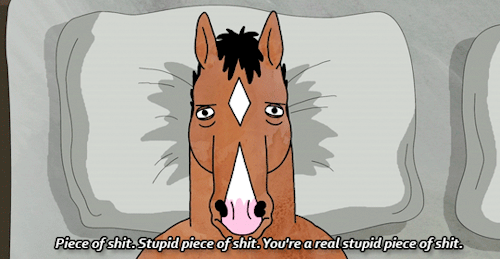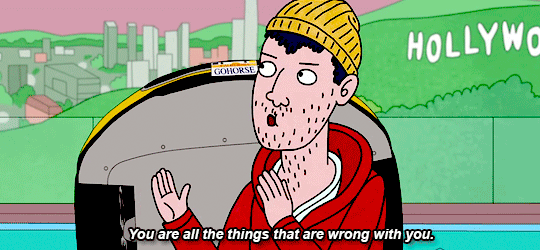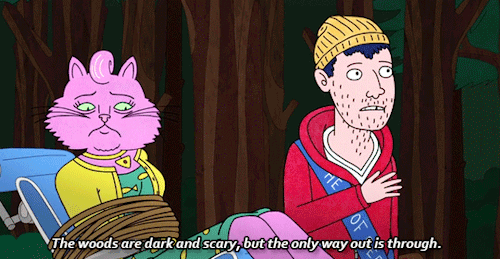Written by Devonn Patterson
WARNING: Spoilers for Season 4 of BoJack Horseman below.
Anyone who knows me well knows how much I love animation. I’m definitely that friend that is more into cartoons than “real-life” movies, but I’m past the point where I feel bad about it. Animation, as Brad Bird once said on the commentary of his 2005 hit The Incredibles, is not a genre, but a medium. It has special meaning to me because it literally and figuratively gives color to my life; it’s a healing and invigorating force. Most of us know that animation is far from ‘kid’s stuff’ nowadays, especially with the advent of online original animated shows. One Netflix original has enthralled me for the last two years, and its protagonist is an anthropomorphic animated horse with depression.

BoJack Horseman from 04×06 lying in bed and thinking, “Piece of shit. Stupid piece of shit. You’re a real stupid piece of shit.”
(Image credit: horseman-bojack.tumblr.com)
BoJack Horseman has surprised a lot of people with its depth and storytelling, including myself. A friend once told me (before I goaded her into watching it) that she “thought it was like Family Guy but with a horse,” and nothing could be further from the truth (full shade to Family Guy). I began watching it with friends when I returned from studying abroad in 2015. Intrigued, I sought out the series to finish on my own. What began as an introduction to possibly one of the biggest animated jackasses I’d ever seen on screen eventually helped me further my own journey into self-improvement. At the time, there were only 2 seasons, and by the end, I was hooked and invested in each of the main characters.
A lot of viewers see themselves in BoJack, but I look at BoJack and I see someone I truly do not want to become in any way, shape, or form. This is not to say that I am free from self-loathing, destructive impulses, and the urge to isolate and push others away just like he does, but I have refused to let them to run my life. I think this is partially because I was lucky (?) enough to reach my low point in when I was 20 – I’m 24 now – a relationship violently imploded, fully shifting me off center and into a chasm of despair. Feeling that I’d mostly hit rock bottom, I began to take an honest look at where I’d come from and how I – not anyone else – landed myself in that kind of situation; the choices and unspoken needs and hurts that drove me into the arms of someone with whom I wasn’t compatible.
I see many people in my past and present throughout BoJack Horseman. Take Princess Carolyn’s need for validation and desire to have a loving relationship conflicting with her devotion to her work and combine it with BoJack’s snarkiness, crippling emotional vulnerability, and tendency to lash out at others when hurt, and you have a simulacrum of my mother and father. And it’s because I saw my father in BoJack that I was even further motivated to not end up like him.
While I have my mother’s quiet mannerisms and conscientiousness, my passionate, emotionally intense temperament is more like my father’s. When we feel passionate about something, we won’t back down, which led to a lot of bumping heads. I stopped speaking to him completely in my late teens, something I didn’t realize was the first step on a long journey to healing from the emotional and religious abuse I endured at his hands. Free from his toxic influence, I was able to safely to step back and evaluate the relationship, and found him to be belligerent, childish, emotionally volatile and apt to lash out at others when hurt. I then had a startling realization; these were my worst traits in my teen years. This cost me a lot of relationships and earned me a lot of hurt, but at some point I realized that just because I was hurting didn’t give me the right to hurt others.
Or, as Todd tells BoJack plainly in Season 3, Episode 10, It’s You:

Todd from BoJack Horseman saying “You are all the things that are wrong with you.”
This, I believe, is where both BoJack fails, at least initially. As of the current season, he has learned that his actions have consequences and begun to internalize and implement the lessons that will prevent him from making more mistakes and finally allow him to heal.
Healing, to me, has to come to mean taking full responsibility for oneself. A lot of people stumble through life blaming everyone but themselves for their pain and their foibles, but all that does is rob one of a rich opportunity for self-discovery and developing personal power. That includes preventing your suffering from affecting others as much as possible, but more importantly, not turning the knife on oneself. In Season 1, Episode 5 (Live Fast, Diane Nyugen), Diane confesses to BoJack that she still wants validation from her toxic, emotionally abusive family, and asks if that’s “really stupid.” When BoJack says yes – definitely not the answer Diane was hoping for – and stresses the importance of moving on and “living forward,” Diane responds:
In essence, BoJack urges Diane not to turn the knife on herself – to not do something that will just make her feel invalid and feel bad about herself. This scene has always stuck with me, but has greater meaning for me today. I watch this scene and remember that if my healing is to be complete, I need to do my best to not re-open my wounds again and again while they heal. I need to, in BoJack’s words, not “go back there.” And though sometimes we may need to retreat to our own figurative cabin in Michigan to start to figure out where to go from where we are, it is indeed important to “keep living forward.”

Todd Chavez telling Princess Carolyn: “The woods are dark and scary, but the only way out is through.”
(Image credit: horseman-bojack.tumblr.com)



Interesting analysis of the show and and introspection of self. The personal growth is lovely. “There is nothing Noble in being Superior to your fellow man; true nobility is being Superior to your former self.” -Ernest Hemingway
LikeLike